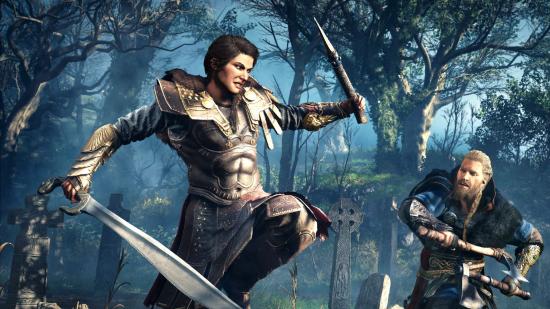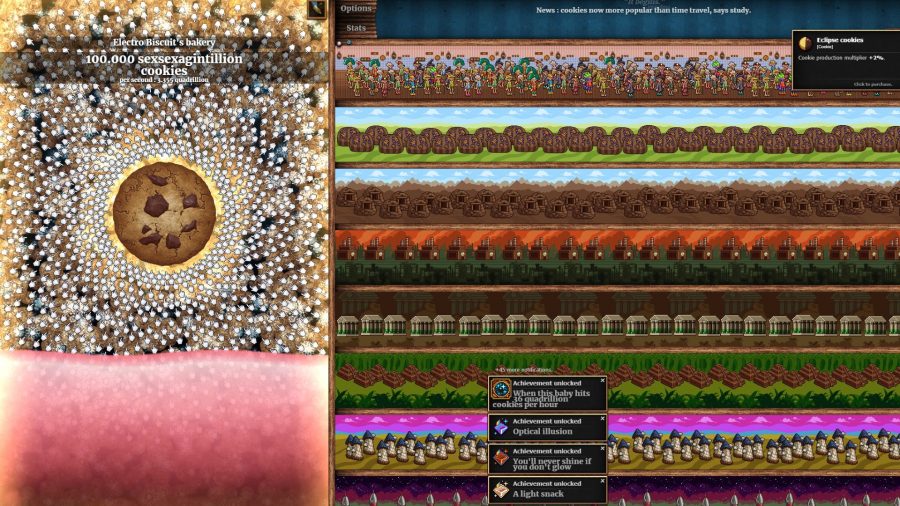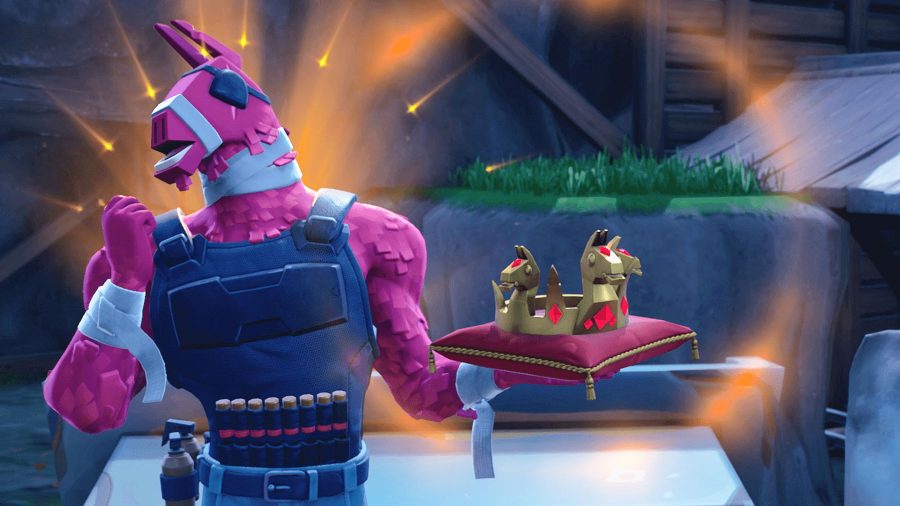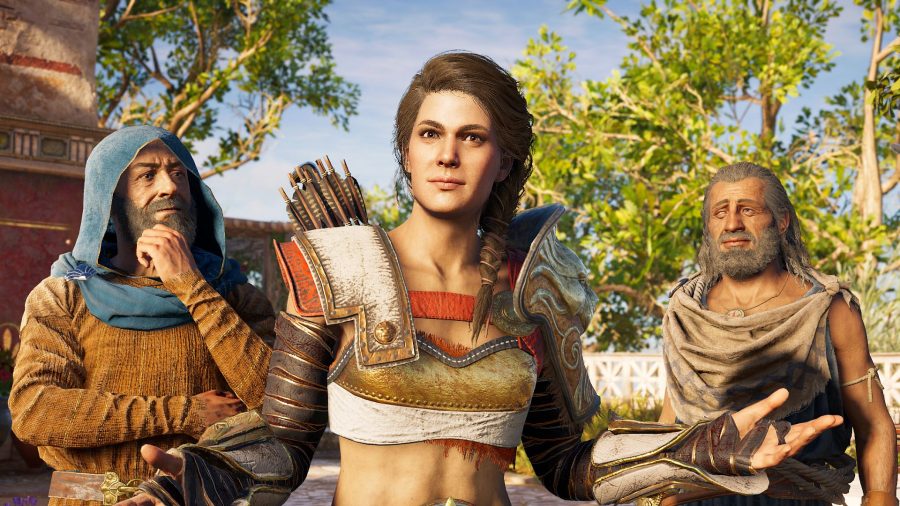I spent 633 hours playing Cookie Clicker on Steam this year. Well, I probably spent single-digit hours actually ‘playing’ the game. The rest of the time, it ran in the background of my PC, and my mind, bringing me back for regular check-ins to see what new upgrades were available and what fresh horrors the Grandmatriarchs had wrought in my cookie empire.
Boy, it’s a lucky thing this sort of addictive gameplay loop is limited to five dollar indie games and not triple-A games whose revenues depend on you regularly dumping in more money, huh? If, say, the new Assassin’s Creed took over 100 hours to ‘complete’ and was filled with incentives to keep you playing weeks and months after you’ve rolled credits, that might prove to be a pretty lucrative business avenue for a company like Ubisoft. Wait, how long was Assassin’s Creed Valhalla again? Oh. Oh, this is already happening, isn’t it?
Ages ago, a pretty limited number of games were designed to eat your time in this way – essentially just MMOs. Sure, PlayStation RPGs could put ’50 hours of gameplay!’ down as a back-of-the-box bullet point, but it was only games like Everquest and World of Warcraft whose entire business models were designed around keeping you playing for months. MMO developers needed you to keep paying subscription fees, as well as logging into the game so that everyone else would have someone to group up with.
Now, the majority of triple-A games are built with ‘recurrent consumer spending‘ in mind – and if you revolt at that terminology, just think how it feels to listen to the financial reports of Ubisoft, EA, and Take-Two every quarter. We’ve spent a long time complaining about microtransactions, which are typically defended in terms like ‘it’s just cosmetic’ and ‘it’s entirely optional’, and in the vast majority of cases those things are entirely true.
But in order to get you to buy into those microtransactions, publishers don’t just have to make a game you like – that game has to become a significant part of your life. You might check out the Assassin’s Creed II DLC one weekend if you played through the main game months ago, but you’re not going to pick up that sick new Eivor skin on the Ubisoft Store unless you’re living in Assassin’s Creed Valhalla every day.
The design of Assassin’s Creed II didn’t have to change to justify its DLC. The design of Assassin’s Creed Valhalla already has changed. Valhalla has daily quests, community challenges, and seasonal events. It has a giant skill tree that can be respecced at any time so you can try out the three new skills added in every major patch, rather than one that provides a satisfying power curve. The story isn’t built to give you a carefully paced payoff after a few dozen hours of play – it’s built to string you along so that you can get wrapped up in the regular cadence of events and new content drops.
Games as a service aren’t inherently nefarious. Fortnite and Apex Legends can now afford to regularly update their maps and playable rosters, keeping things consistently fresh in what might otherwise be stagnant multiplayer games. Stretching out your content over the course of months isn’t a bad thing, either – it’s worked for TV for decades. Fortnite Chapter 3 just came out? Cool, now you and your friends have a new excuse to hop in a Discord call and try out the new stuff. It can work for single-player games, too. 2016’s soft reboot of Hitman used an episodic release to encourage players to revisit its robust sandboxes again and again, and these days the devs are still continuing to drop new features into those levels.
But for everything that might make you want to check in, there are also plenty of reasons that you have to check in, and that’s when time sinks get more difficult to swallow. Did I really enjoy spending an hour in Fortnite so that I could drop in, pick up a couple of floating objects for a weekly challenge, then instantly get myself killed so I could do it again? Well, I guess I liked it about as much as I enjoyed ‘playing’ Cookie Clicker. And hey, that battle pass expires in three months, so I had to do it, right?
But when tightly paced games with linear narratives expand to pad out a publisher’s engagement metrics, it’s tough to feel an emotional investment that matches the time you out in. In 2018, Assassin’s Creed Odyssey caused a minor furore among fans when Ubisoft sold a permanent XP booster. I played through Odyssey without it, and reached the level cap just before completing all of the game’s major side quests, which felt like just about the right progression curve at the time. But even the feeling that maybe your time is being wasted, especially in an effort to push a further transaction, can kill any fun you’re having in a game.
I burned out on Assassin’s Creed Valhalla sometime around the 50 hour mark, after clambering over yet another beautiful mountain crafted by a team of immensely talented artists and designers. After four dozen hours, the sprawling open-world stopped feeling like medieval England; I could only recognise those dots on the map as more content to be consumed. Did I feel like a Viking exploring the countryside? No. Did I even feel like I was having fun with an entertaining videogame? Absolutely not. By that point, I just felt like a poor sap who’d been tricked into giving Ubisoft half-a-hundred hours of my life. The $60 didn’t even really sting anymore.
I’d cut Ubisoft a little more slack here if the publisher’s output weren’t trending towards increasingly bloated runtimes and overstuffed open worlds. Part of me hopes that Assassin’s Creed Infinity, if it’s being built from the ground up to facilitate a never-ending quest, can build an episodic story I’ll be excited to revisit as it unfolds. But given how diminished the returns have been with three consecutive Assassin’s Creeds in this same RPG formula, that hope is tough to hang onto.
And NFTs – like the ones being introduced via Ubisoft Quartz – are the final nail in the coffin. One set of those Ghost Recon Breakpoint NFTs is only available to players who’ve stuck with the game for over 600 hours because, presumably, artificial scarcity creates even more value when you’ve given away 25 days of your life for it. Phrases like ‘play-to-earn’ haven’t yet made the transition from investor calls to triple-A gaming, but they’re close enough to taste. Your time is more valuable than your money, and even game publishers are starting to wise up to that fact.



